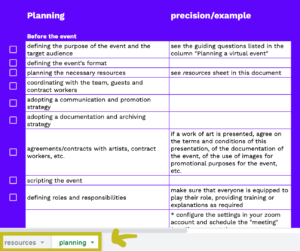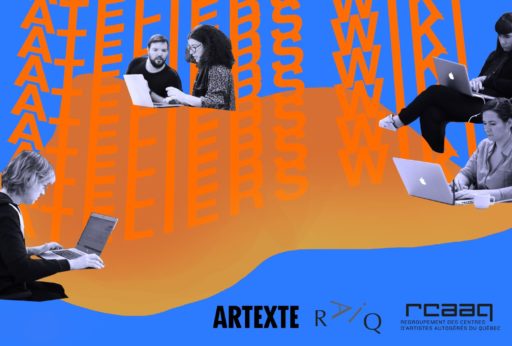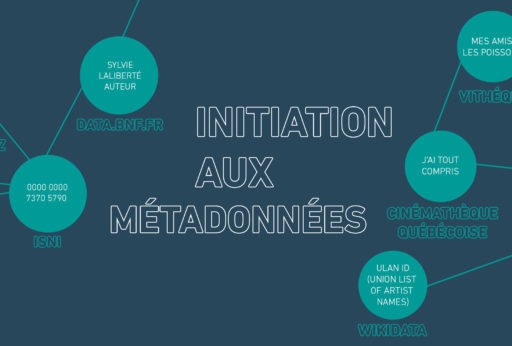We have had the opportunity to familiarize ourselves intimately with the idea of a virtual event since last spring (for those who might be interested, I had, at the time, written a post on the theme of “Digital Reconfigurations” for ARCA). Many of us have learned a great deal about the subject through organizing and participating in this type of activity and through reading and discussions with people from our sector and the broader cultural community.
Here is a list of things to consider when planning a virtual event. It is a checklist developed over the past year, which I invite you to consult as needed. You will certainly notice that this list does not cover all situations, nor all existing and future tools, the intention being to offer food for thought and a starting point for our community.
You will find the list in a publicly available google sheet format, so that anyone can download it and make it their own (note that the spreadsheet includes two sheets: resources and planning).
Before I let you explore the checklist, I will note here in a slightly longer form a few questions that may help you determine the type of equipment that will be relevant to your event.
What is your goal for this event?
Would you like to encourage discussion and exchange, present a work or program of works to a broad or targeted audience, or pass on expertise or knowledge? Is there a legal framework for holding the event (think of general assemblies for NPOs)?
What is your target audience?
Is your event private or open to the public? Do you need to provide a registration and ticketing system? A videoconferencing application (e.g. Zoom) may be appropriate for a private, registration-based or simply more discussion-oriented event. A live streaming on social networks (e.g. YouTube and Facebook) will facilitate a more open, but more one-way broadcast.
Also consider accessibility issues: should you provide translation and captioning in French, English, Indigenous languages, or sign language interpretation?
Finally, you may ask yourself what tools your audience will be most comfortable with and how you will reach them? Will participants need an account (e.g. Facebook) or need to download an application (e.g. Zoom, in some cases) to access the content? Do you see this as a barrier?
What type of content will you showcase?
For the presentation of a work of art or a reproduction of a work of art, we will focus on the quality of the image/sound by choosing a platform that will allow the distribution of larger files. If the “content” consists of a conversation with a guest, a videoconferencing application may be a coherent choice.
It is also recommended that you plan in advance whether you will need to record the event and why. This will have implications on the agreement you will have with the artists or guests. It is also an important criterion for choosing the platform: will it automatically keep a recording? Can you export a copy locally? Can you leave public access to this content on the same platform (e.g. Facebook and YouTube)?
What resources do you have or need to plan for?
What is the available budget for your event? What skills and expertise are available within your team and which ones will you need to find externally (graphic design, animation, sign language interpretation, etc.)? Do you already have a Zoom/YouTube/Instagram/Facebook/etc. account? Do you have access to the necessary equipment and infrastructure (high-performance internet connection, ideally wired, ethernet cable, computer with all the necessary ports, webcam, microphone, video recording and streaming software, etc.)?
I will stop the avalanche of questions here! If you notice that something important is missing from the checklist, please write to me and I will add it. I hope you will find these ideas useful for the planning of your next virtual event.
Best,





